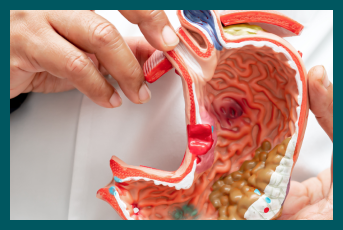How to Tell the Difference Between Gastro and Food Poisoning?
Written by Dr Nelson Lau, MBBS FRACGP, GP & Digital Health Specialist. Blog updated on 10 March, 2025. Originally published on 6 Feb 2025.

Contents

In the complex world of gastrointestinal issues, distinguishing between gastroenteritis (commonly known as gastro) and food poisoning can be challenging. Both conditions can disrupt your daily life, leaving you feeling miserable and questioning what went wrong. This article aims to shed light on these common yet often misunderstood ailments, providing you with the knowledge to differentiate between them, understand their causes, recognise their symptoms, and know how to respond appropriately.
How to know if you have gastroenteritis or food poisoning?
Gastroenteritis and food poisoning share many symptoms, including nausea, vomiting, diarrhoea, stomach cramps, and fever, making it difficult to tell them apart. Gastroenteritis is typically caused by viral or bacterial infections that inflame the stomach and intestines. It can be contracted through contaminated food, water, or close contact with an infected person. Food poisoning, on the other hand, is caused by consuming food or drinks contaminated with harmful bacteria (like Salmonella or E. coli), viruses, or toxins. While both conditions can cause digestive distress, food poisoning often has a sudden onset, with symptoms appearing within hours of eating contaminated food, whereas gastroenteritis symptoms may develop more gradually over one to three days. Another way to differentiate the two is by the duration and severity of symptoms. Food poisoning usually resolves within 24 to 48 hours, especially with proper hydration and rest, whereas viral gastroenteritis can last up to 10 days, depending on the severity. Food poisoning may also include specific symptoms like high fever, muscle aches, and bloody diarrhoea, which are less common in viral gastroenteritis. If symptoms persist, worsen, or include severe dehydration, consulting a doctor—especially through telehealth services—can help determine the cause and the best course of treatment.Gastro vs Food Poisoning
| Category | Gastroenteritis | Food Poisoning |
|---|---|---|
| Definition | Widespread inflammation of the stomach and intestines, usually caused by viruses, bacteria, or parasites. | Ingestion of harmful bacteria, viruses, or toxins from contaminated food or beverages. |
| Causes | Commonly caused by viruses like norovirus and rotavirus, but bacteria (E. coli, Salmonella) and parasites can also be responsible. Spread through direct contact or sharing personal items. | Results from consuming contaminated food or drinks. Common culprits include Salmonella, E. coli, Campylobacter, and Listeria. |
| Symptoms | Diarrhoea, vomiting, nausea, abdominal cramps, fever, and headaches. | Similar symptoms to gastro but often with a more abrupt onset. May include chills, weakness, and, in severe cases, bloody stools. |
| Diagnosis | Based on symptoms, stool samples may be tested in some cases to identify the pathogen. | Primarily symptom-based. In prolonged or severe cases, stool or blood tests may be conducted to determine the contaminant. |
| Treatment | Focuses on rehydration and rest. Oral rehydration solutions help restore fluids and electrolytes. Antiviral medications are rarely needed. | Rehydration is key. Antibiotics may be used if bacteria are identified, but they are ineffective against viral infections. |
| When to See a Doctor | Severe dehydration (dry mouth, reduced urination, dizziness), high fever, or symptoms persisting beyond a few days. | Blood in stools or vomit, high fever, or prolonged symptoms require medical attention. |
| Can Telehealth Help? | Yes! Online doctors can assess symptoms, provide medical advice, and prescribe medication if needed, helping determine if in-person care is required. | Yes! Virtual consultations offer a convenient way to get medical guidance and prescriptions without leaving home. |
Gastro and food poisoning defined
To set the stage, imagine your digestive system as a bustling metropolis. Gastroenteritis is akin to a widespread civil unrest within this city—chaos erupts, disrupting the usual harmony. It's characterised by the inflammation of the stomach and intestines, typically triggered by a viral invasion, although bacteria and parasites can also instigate this turmoil. On the flip side, food poisoning is more like a precision strike—specifically, the ingestion of harmful bacteria, viruses, or toxins lurking in contaminated food or beverages.Causes behind gastro and food poisoning
The root causes behind these disturbances paint a picture of how these disruptions come to be:- Gastro: Viruses such as norovirus and rotavirus are frequent instigators, turning your digestive tract into a battleground. Bacteria like E. coli and Salmonella, along with parasites, can also be culpable. Transmission often occurs through direct contact with an infected person or by sharing personal items like utensils and towels, highlighting the importance of good hygiene practices.
- Food poisoning: This condition is directly tied to dietary indiscretions—consuming food or drink tainted with pathogens. Notorious offenders include Salmonella, E. coli, Campylobacter, and Listeria. Unlike gastro, the blame here lies squarely on what you've eaten, underscoring the critical role of food safety measures.
Reading the signs: Distinguishing symptoms
Recognising the warning signals emitted by your body is crucial for diagnosing and addressing these issues:- Gastro: Expect a symphony of discomfort including diarrhoea, vomiting, nausea, and abdominal cramps. Additional accompaniments may include fever and headaches, further complicating the orchestration of daily activities.
- Food poisoning: While the repertoire of symptoms overlaps with those of gastro, food poisoning often announces its presence with a more abrupt onset. Chills, weakness, and in severe instances, bloody stools, serve as stark reminders of the body's distress signal.
Experiencing these symptoms? Speak with a doctor within 15 minutes.
See a Doctor now
Available 24/7, across Australia.
How to prevent food poisoning?
You can prevent food poisoning by using the following measures:- Wash hands and surfaces before handling food.
- Cook meat, seafood, and eggs to safe temperatures.
- Refrigerate perishable foods properly.
- Avoid cross-contamination between raw and cooked foods.
- Be cautious when eating raw foods like sushi or salads.
Diagnosing gastroenteritis and food poisoning: Key differences
A doctor may diagnose gastroenteritis or food poisoning based on:- Medical history and symptoms timeline
- Physical examination
- Stool or blood tests (for bacterial infections)
- Dehydration assessment
What are the common treatments for gastroenteritis and food poisoning?
The treatment for gastroenteritis and food poisoning mainly focuses on symptom relief, preventing dehydration, and supporting recovery. Most cases resolve on their own within a few days, but some may require medical intervention.- Hydration therapy: Oral rehydration solutions or IV fluids in severe cases.
- Medications: Anti-nausea and anti-diarrhoeal drugs (under medical guidance).
- Antibiotics: Only used for bacterial infections like Salmonella or E. coli.
- Rest and dietary adjustments: Help ease recovery.
Who is at higher risk for complications from gastroenteritis and food poisoning?
While most cases of gastroenteritis and food poisoning resolve on their own, some individuals are at a higher risk of developing severe complications, including dehydration, electrolyte imbalances, and long-term gastrointestinal issues.- Infants and elderly individuals: More vulnerable to dehydration.
- People with weakened immune systems: Chronic illness or immune disorders increase risk.
- Pregnant women: Dehydration and infections can affect the baby.
- Those with preexisting conditions: Diabetes or kidney disease may worsen.
Diagnosing the disruption: Identifying the cause
Pinpointing the exact nature of the disturbance requires a bit of detective work:- Gastro: Diagnosis is primarily based on the constellation of symptoms presented. In some cases, stool samples may be analysed to identify the offending pathogen, providing a clearer picture of the underlying cause.
- Food poisoning: Similarly, diagnosis hinges on symptomatology. However, in severe or prolonged cases, blood or stool samples may be examined to isolate the contaminant, guiding the treatment approach.
Treatments for Gastro and Food Poisoning
Addressing these conditions involves strategies aimed at mitigating symptoms and promoting recovery:- Gastro: The focus is on rehydration and rest. Oral rehydration solutions can replenish lost fluids and electrolytes, serving as a lifeline during this tumultuous period. While antiviral medications are seldom prescribed, they may be considered in specific scenarios.
- Food poisoning: Rehydration remains paramount. Antibiotics may enter the scene if bacterial culprits are identified, though they are ineffective against viral agents. The key is to support your body as it fights off the invaders.
Knowing when to call a doctor?
Recognizing the red flags is essential for timely intervention:- Signs of severe dehydration, such as dry mouth, reduced urination, and dizziness, warrant immediate attention.
- Presence of blood in stools or vomit, high fever, and persistent symptoms beyond a few days are clear indicators to consult a healthcare provider.
Can an online doctor help through telehealth appointment?
In our digital age, telehealth offers a convenient avenue for seeking medical advice without leaving the comfort of your home. Virtual consultations enable healthcare professionals to assess your condition, provide guidance, issue online doctor medical certificate and even prescribe medication if necessary, determining whether in-person care is required.Frequently Asked Questions: Demystifying myths and misunderstandings
Can gastroenteritis be food poisoning?
Not exactly. While both involve gastric distress, gastroenteritis refers to inflammation of the stomach and intestines, often due to viral infections spread through various means. Food poisoning specifically results from ingesting contaminated food or drink.How long does gastro food poisoning last?
Recovery times vary, but most people start feeling better within a few days to a week. The duration depends on the severity of the illness, the type of pathogen involved, and individual immune response.How to sleep with gastro?
Elevate your head while sleeping to alleviate nausea, stay well-hydrated, and consider using over-the-counter medications to manage symptoms. Creating a calm and comfortable environment can also aid in restful sleep.How to heal your gut after food poisoning?
Begin with a bland diet, gradually reintroducing more varied foods as your stomach permits. Incorporating probiotics can help restore beneficial gut flora. Adequate hydration and patience are key to allowing your digestive system to heal. Armed with the knowledge of how to distinguish between gastro and food poisoning, you're now better prepared to navigate these challenges. Understanding the nuances between these conditions enables you to take proactive steps towards managing your symptoms, seeking appropriate medical advice, and ultimately, recovering more swiftly. Remember, your digestive health is a cornerstone of your overall well-being. By staying informed and vigilant, you can minimise the impact of these common ailments on your life. As we conclude, let's reflect on the importance of preventive measures—good hygiene practices, safe food handling, and a balanced diet—all play pivotal roles in safeguarding your digestive health. Next time you encounter a bout of stomach trouble, you'll be equipped with the insights to tackle it head-on.Need time off to recover? Get your medical certificate online within 15 minutes.
Request a medical certificate
Available 24/7, across Australia.
What we treat
- Cough
- Nausea & vomiting
- Fever
- Hayfever
- Fatigue
- Sore throat
- Acne
- Hair loss
- Gout
- Eczema
- Rosacea
- Sunburn
- UTI
- Erectile dysfunction
- Contraception
- Morning sickness
- Morning after pill
- Prostate health
- Anxiety
- Depression
- Stress
- Grief & loss
- Antidepressants
- Premature ejaculation
- Asthma
- Blood pressure
- Blood thinners
- Diabetes
- Cholesterol
- Migraines & headaches
- Allergies
- Body ache
- Heartburn & reflux
- Sleep disorder
- Pain relief
- Gastro
Related Articles
Disclaimer
This blog is for general informational purposes only and does not indicate that Hola Health provides all treatments or preventive measures mentioned. It is not intended to be a substitute for professional medical advice. Always seek the guidance of your doctor or other qualified health professional with any questions you may have regarding your health or a medical condition. For emergencies please immediately contact 000. Any medical topics discussed are intended to educate, not to imply availability through Hola Health.
 Facebook
Facebook  X
X  Copy Link
Copy Link



